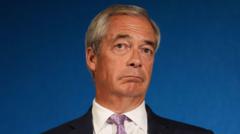Are Young Women Leaning More Left Than Men? Discover the Reasons!

This article explores the growing political divide between young men and women in the UK, revealing significant differences in their voting patterns, party preferences, and political attitudes. Recent polling indicates that young women are increasingly aligning with progressive, left-leaning parties, while young men are gravitating towards the right, highlighting a shift in political landscapes influenced by factors such as education, social media, and generational attitudes.
Last updated: 23 October 2023 (BST)
Key Takeaways
- Young women in the UK are more likely to identify as left-wing compared to their male counterparts.
- Polling indicates that Labour and the Green Party are favoured by young women, while young men are leaning towards Reform UK and Conservative ideals.
- Higher education appears to correlate with more liberal political views, particularly among women.
- Social media plays a significant role in shaping political opinions, especially among younger voters.
- Concerns are rising about the increasing hostility of young men towards feminist ideals and traditional gender roles.
Understanding the Political Landscape
British politics is undergoing a period of notable volatility, with traditional party loyalties eroding. This shift is particularly evident among young voters, as highlighted in a recent 2025 survey conducted by Focaldata for the John Smith Centre. The study, which surveyed over 2,000 individuals aged 16 to 29, reveals that 20% of young women identified as left-wing, compared to only 13% of young men. The majority of both genders, however, identified as neither left nor right, indicating a growing disillusionment with the conventional political dichotomy.
Voting Patterns in the 2024 General Election
During the 2024 general election, a stark difference emerged in the voting behaviour of young men and women. Only 12% of women aged 18 to 24 cast their votes for Reform UK or the Conservatives, while a significantly higher 22% of men in the same age group did. Labour emerged as the most popular choice among both sexes, with a slight lead among younger women. Notably, the Green Party garnered 23% of the votes from young women, while only 12% of young men expressed support for the party.
Factors Influencing the Divide
Several factors contribute to the apparent divide in political preferences between young men and women. Researchers have pointed out that young women are increasingly leaning left, motivated by a desire for progressive change and a response to contemporary social issues. Conversely, young men appear more attracted to conservative or right-wing ideologies, which some attribute to traditional gender roles and societal expectations.
Education and Political Views
One significant factor influencing this divide is education. It has been observed that young women are more likely to pursue higher education than young men, where they are exposed to socially liberal ideologies. Polling from YouGov indicates that university graduates tend to support left-wing parties more than non-graduates. This educational gap may foster differing political attitudes, leading to the observed trends in voting behaviour.
The Role of Social Media
Social media platforms are playing an increasingly vital role in shaping political opinions among young voters. The ability to engage with alternative political narratives online allows young people to explore various ideologies beyond the traditional two-party system. Dr Ceri Fowler, a fellow in comparative politics at Oxford University, emphasises that if young individuals feel disenfranchised, they are more likely to engage with alternative political movements presented through social media channels.
Gender and Political Identity
The growing gender divide in political identity has sparked discussions among political analysts. Rosie Campbell, professor of politics at King's College London, notes that while both genders have historically moved towards liberal views regarding gender equality, an increasing number of young men are exhibiting hostility towards these ideals. This sentiment may be driving them towards populist and radical right parties that endorse traditional gender roles.
Case Studies: Voices from the Youth
Younger voters like Lucy Thomas, a 19-year-old student from Glasgow, illustrate the shifting political sentiments. Having initially supported Labour, she has expressed a growing dissatisfaction with the party, indicating that her peers are more interested in alternative political movements, particularly those associated with Jeremy Corbyn. This trend signifies a departure from traditional party loyalties and reflects the broader disillusionment felt by many young voters.
Daze Aghaji, a 25-year-old environmental activist, echoing similar sentiments, highlights the desire among young women for a progressive future. She notes that many women are increasingly concerned about their freedoms and are gravitating towards parties that represent these values, such as the Green Party. In contrast, young men like Joseph Boam, a 22-year-old Reform UK councillor, acknowledge the appeal of right-leaning parties and stress that the narrative surrounding young men's political inclinations often overlooks the broader discontent shared across genders.
Challenges and Opportunities
As the political landscape evolves, parties must adapt to the changing preferences of young voters. The Conservative Party, for instance, has struggled to gain traction among the youth demographic, primarily drawing support from older voters. On the other hand, the Reform Party is aware of its need to appeal to female voters and has initiated campaigns to address this gap. Recent efforts, such as the launch of the Women for Reform campaign, aim to attract women to the party by showcasing female leaders and their contributions.
Progressive Movements and Traditional Ideals
The divide between young men and women in their political affiliations raises questions about the future of political discourse in the UK. Mark Brooks, director of policy at the Centre for Policy Research on Men and Boys, suggests that while there is a visible drift from traditional party lines, it is essential to avoid framing young men as the sole culprits of this shift. Instead, he advocates for addressing the broader socio-economic issues that contribute to the disillusionment experienced by both genders.
Looking Ahead
As the political scene becomes increasingly fragmented, understanding the factors driving this divide will be crucial for parties seeking to engage younger voters. The ongoing evolution of political affiliations among young men and women reflects deeper societal changes, including attitudes towards gender, education, and social media influence. Future elections will likely showcase these trends as parties attempt to navigate the complex landscape of young voter sentiment.
FAQs
What are the main differences in political views between young men and women in the UK?
Young women in the UK are increasingly identifying as left-wing and supporting progressive parties, such as Labour and the Green Party. In contrast, young men are leaning towards right-wing parties like Reform UK and the Conservatives.
How does education influence voting behaviour among young people?
Higher education correlates with more liberal political views, particularly among young women, who are more likely to pursue higher education than young men. Graduates tend to support left-wing parties more than non-graduates.
What role does social media play in shaping young voters' political opinions?
Social media platforms allow young voters to engage with alternative political narratives, making it easier for them to explore ideologies beyond traditional party lines. This engagement can lead to varying political affiliations and sentiments among young people.
Are traditional gender roles influencing political preferences among young men?
Yes, many young men are gravitating towards right-wing parties that endorse traditional gender roles. This trend may be partly due to a perceived threat from progressive movements and a desire to maintain conventional ideals of masculinity.
What steps are parties taking to address the gender gap in their support?
Parties like Reform UK are launching initiatives aimed at attracting female voters, such as the Women for Reform campaign, which showcases female leaders and their contributions to the party's objectives.
Published: 2025-08-22 23:56:10 | Category: technology



